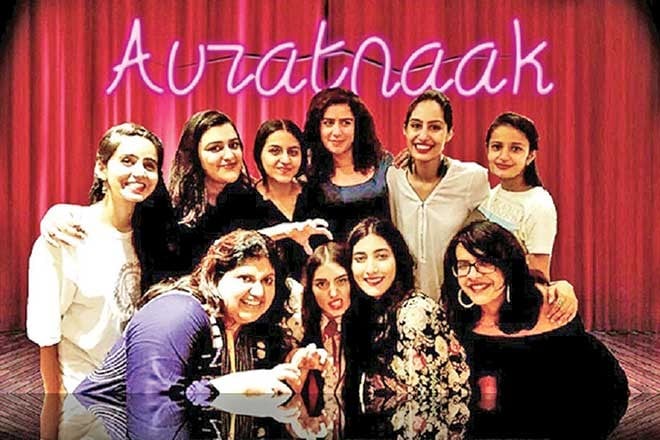

Pakistan is a country filled to the brim with diversity and lots of undiscovered talent and there has been a recent rise in different movements and organizations coming together with the goal of uniting this new talent from across the country. With Coke Studio Explorer, to social media helping discover unique women and men from across the nation, there is a feeling of national unity being cultivated in mainstream culture. Between this space is a slow but steady alternative stand-up comedy movement taking place, uniting comedians or that don’t or can’t have a conventional audience. These small groups of comedians (mostly women, a rarity in the world of stand-up comedy), are holding regular shows and touching topics that others steer clear of.
Many people find sexism hidden at the root of a lot of our mainstream comedy. Shows like the hit sitcom Bulbulay, for example, which has entertained Pakistan for almost a decade, makes women the butt of most of its jokes. Bringing down these gender stereotypes, female comedy troupes are thriving with the most recent addition being that of Pakistan’s first comedy drag show.
The idea for an all-women line up in a stand-up show came from Hassaan Bin Shaheen, who was concerned that while there were still some women in improv comedy troupes, the stand-up scene was pretty much male centric. Faiza Saleem who had created Khawatoons, Pakistan’s first female improve group helped him form the Auratnaaks. This concept, which originated in Karachi, has now scaled across Pakistan with chapters in Lahore and Islamabad.
It’s no secret that performance spaces in Pakistan are mostly restricted to men. Zarah Zahir, who’s a part of the Auratnaak troupe in Lahore shares her thoughts on why she thinks that’s so. "Humour is something frank, and in a society where frankness isn’t encouraged in women it’s hard to be forthcoming," she says. Sabah Bano Malik, who is part of Auratnaak in Islamabad also weighs in. "Public spaces in Pakistan have developed as a space for men. In the case of comedy, for a long time women didn’t feel or know that there was a platform out there that they could make their own."
Another problem that one imagines a female comedy troupe that prides itself in being a feminist act is people (incorrectly) viewing them as ‘feminazis’, the feminist version of a Nazi. Does that bother the performers? Malik says, "The feminazi idea pops up but I don’t think I need to address that in my material because if you think that women wanting to be on an equal footing with men are feminazis then you’re at the wrong show to begin with." In her standup routine, she touches upon the topics of body shaming and dating amongst other taboo subjects. "Just as a society, a lot of people aren’t ready for us to talk about these things and that can lead to some cringe worthy moments but that’s what makes it great. We’re just trying to make female stand-up comedy something that’s not so radical," she says. Zahir believes that while female comedy troupes are making headway in the right direction, if made mainstream they defeat the purpose of being equal in comedy. "Comedy should be mainstream and female comedians should be mainstream."
Pakistan’s first drag comedy show, Liberals Ki Akhri Saazish opened on August 10 in Lahore and was sold out two days before the opening night. This probably had a lot to do with the fact that one of the acts was social media sensation Muhammad Moiz of Shumaila Bhatti fame; the snapchat filtered ‘desi bombshell’ reflecting on the realities of life. The show was his new character, Miss P Chattni’s debut outing alongside Annaya Shiekh, a member of the Auratnaak comedy troupe and a transgender rights activist.
On Shumaila Bhatti’s success, Moiz revealed, "I realized our social media and comedy has very little representation of the middle class woman. When they are there they are either very blanketed or depicted as ultra-modern women but we need representation of the girl on the street. The girl who knows how to speak English but isn’t very well versed in it, has a regular income and is just average looking." He felt that Shumaila Bhatti is filling that gap but her mainstream audience means that there is a lot Moiz can’t talk about. "Miss P Chattni is everything that Shumaila isn’t so I can talk about everything I want whether it’s sex, body positivity or the explicit adventures in the life of an urban millennial Pakistani," he laughs.
Moiz gets offers for stand-up comedy but he feels that he can’t get away with much if he’s not under the guise of a character. "Everyone doesn’t understand drag and everyone wouldn’t come to see it so your artistic identity becomes a filter, which is great in this particular case." When asked if he feels that comedy has the power to change mindsets he says, "Shumaila Bhatti can’t bring social change alone but she disrupts the social media comedy scene. The best part is that she is not preachy; the only time I explain the methodology behind her is when I give interviews like these. The process is very organic, people watch it and are subliminally receptive to it."
While Lahore’s Auratnaak troupe performed this weekend, the comedy drag show will be taken to Karachi by the end of the month. Such subversive comedy is creating a small ripple among a limited circle and class of people. One can hope that it leads to some self-reflection amongst mainstream comedians and has them reconsider some of their sexist and misogynistic material.